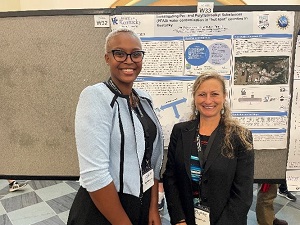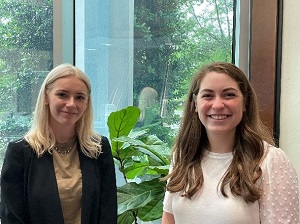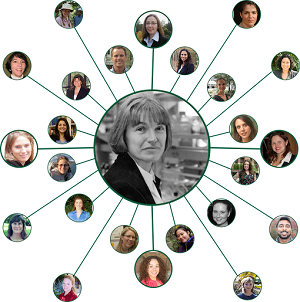Science Leadership
Superfund Research Program (SRP) staff and grantees are committed to advancing SRP research by presenting innovative findings, tools, and technologies to stakeholders in academia, government, and local communities.

Health Science Administrator Heather Henry, Ph.D., co-hosted a workshop at the Association of Environmental Engineering & Science Professors Research and Education Conference, held June 28 in St. Louis, Missouri. The workshop was titled Engineering for Public Health: A workshop on Convergent Research, Implementation Science, and Stakeholder Engagement to Benefit Environmental Health.
SRP Director William Suk, Ph.D., and Henry, spoke with NIEHS Director Rick Woychik, Ph.D., about emerging technology to clean up per- and polyfluoroalkyl substances contamination as part of the Director's Corner. They shared emerging research challenges the program is tackling, and how multidisciplinary, community-engaged research can pave the way to solutions.
SRP Health Scientist Administrator Danielle Carlin, Ph.D., Health Specialist Brittany Trottier, M.P.H., and Suk served on the planning committee of the Complex Exposures in Breast Cancer: Unraveling the Role of Environmental Mixtures workshop held August 24-25. The meeting brought together experts to discuss the state of environmental chemical mixtures and breast cancer research, including cell-based models, animal models, 3-D tissue culture models, epidemiological studies, and approaches for prevention and intervention.
Carlin gave an overview of SRP-funded research revealing how exposure to harmful chemicals through inhalation can pose potential risks to human health at the 2022 International Particulate Toxicology Conference. The meeting was held August 28-30 at the University of New Mexico.

SRP summer interns Kirsten Reid and Anna Kremer presented posters to NIEHS staff at the NIEHS summer intern poster day. Kremer won first place in the graduate student section.
Suk gave a virtual presentation on the e-Asia Joint Research Program at the 2022 International Conference of the Pacific Basin Consortium for Environmental Health. SRP Health Scientist Administrator Michelle Heacock, Ph.D., and Trottier attended the conference on Jeju Island, South Korea, and chaired the student presentation session.

On the 25th anniversary of the death of Karen Wetterhahn, SRP reflects on her continued legacy in scientific excellence and mentorship. SRP created the annual Karen Wetterhahn Memorial Award as tribute to her legacy. Read more about a few past winners who have pursued careers in different disciplines and sectors in the latest Public Health Impact Story.
SRP-funded researchers were recently featured in NIEHS highlights:
- Molly Kile, Sc.D., of the Oregon State University (OSU) SRP Center, reflected on her early years as a trainee at the Harvard University SRP Center working with arsenic-exposed communities in Bangladesh. Now, at OSU, Kile applied the lessons learned at Harvard in her work with Native American communities in Oregon.
- Andres Cardenas, Ph.D., of the University of California (UC), Berkeley SRP Center explained how is applying his epigenetics expertise to investigate how environmental exposures contribute to the development of diseases, and how to prevent them.
- Elizabeth Shapiro-Garza, Ph.D., of the Duke SRP Center was featured in an NIEHS podcast about their collaborative Stop, Check, Enjoy campaign to promote safter fish consumption in North Carolina.
Funded in part by SRP, the 3rd National Per- and polyfluoroalkyl substances Meeting in Wilmington, North Carolina brought together scientists, community members, and policymakers who shared research and, in some cases, emotional stories about the chemicals. The conference was coordinated by researchers at the North Carolina State University, University of Rhode Island, Northeastern University SRP Centers, other scholars, and community organizations.
to Top



